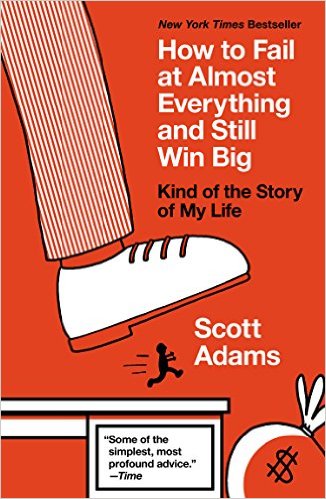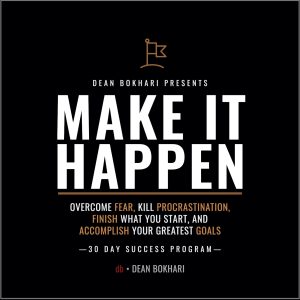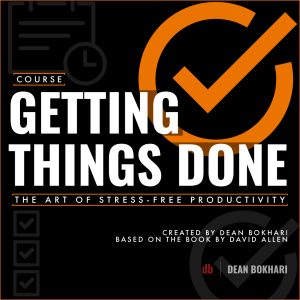
How To Fail at Almost Everything and Still Win Big: Kind of the Story of My Life
By Scott Adams
About
Few people have failed at as many things in life as Scott Adams has. Not only has he been part of two failed restaurants, countless bankrupt tech start ups and even a frozen burrito company, he also lost his voice for several years and can barely use a pencil due to a neurological condition called focal distonia. However, you probably know Scott for a reason entirely different than his numerous business blowups; the unprecedented popularity of his Dilbert comic strip.
How can someone fail so much and still make it big? Scott is the first to admit he’s a mediocre writer and a terrible drawer, yet he’s still managed to create a comic strip that rings true for millions. What was the key to his success? According to Scott, it had nothing to do with what you’ll find in most business self help books.
Instead, Scott harnessed a system that led him through his failures with constantly improving skill sets and a will to embrace opportunities. In How To Fail At Almost Everything and Still Win Big Scott tells us all about his own personal story, carefully including both his struggles and his successes—as well as how they interrelate with one another. All-in-all, his humble approach to his own achievements make him relatable enough to inspire anyone with dreams and ambitions in life… Including you.
If you want to put yourself on the path that is most likely to result in success for you someday, take these big ideas to heart and learn the ways that failure at whatever you try simply becomes the next step towards your eventual success.
Here’s what you’ll learn about in this summary:
- Why failure is never a sign you won’t eventually succeed.
- The right methods to follow to intentionally turn your dreams into a reality.
- What it means to be willing to pay the price for success
- The reasons why thinking of your body as a moist robot is one of the best things you can do to set yourself up for success.
Crucial quotes
“Was my eventual success primarily a result of talent, luck, hard work, or an accidental just-right balance of each? All I know for sure is that I pursued a conscious strategy of managing my opportunities in a way that would make it easier for luck to find me.”
“Success caused passion more than passion caused success.”
“Successful people don’t wish for success; they decide to pursue it. And to pursue it effectively, they need a system. Success always has a price, but the reality is that the price is negotiable. If you pick the right system, the price will be a lot nearer what you’re willing to pay.”
Tweetable Summary
Don’t let failure bog you down. Instead, setup smart systems and be patiently persistent; eventually, you’ll find yourself succeeding.
Links
Downloads
THE BIG IDEAS:
1) Passion is B.S.
“You can’t be humble and say, “I succeeded because I am far smarter than the average person.” But you can say your passion was a key to your success, because everyone can be passionate about something or other. Passion sounds more accessible.”
It’s common when you ask others for career advice to be told to ‘follow your passions’. At first, this advice makes a lot of sense.
Passion makes you persuasive and more likely to sell your ideas to others, so it’s likely to guarantee success, right? According to Scott Adams, this isn’t as true as you might think.
Scott’s experience working as a commercial loan officer taught him that the best loans to make are to the people without passion, because they are the ones that look at the facts and choose their business ventures accordingly. Passionate people are far more willing to take big risks, but this means they are often met with big failures.
Even so, the passionate people that succeed are the ones that write the self help books, so we can’t blame you if you came into this thinking the key to success was passion.
In Scott’s view, it’s easy to be passionate about things that succeed, but it’s not always an indicator that something WILL succeed. In other words, when your business venture is going well, you’ll be sure to be excited about it.
Scott’s undertaken dozens of business ventures in his life and watched his passion wax and wane depending on how successful they were. What was more important, he realized, was his level of personal energy to do what needed to be done to move forward.
That doesn’t mean you should discount your passions, though. Scott also believes it’s easier to be passionate about things we’re good at. In many cases, passion is just a by-product of knowing you’ll be good at something.
For this reason, it’s smart to pay attention to your passions and see how they can work to your advantage. Just be sure to direct them at things that actually make sense.
2) Multiple Failures Don’t Mean You Won’t Eventually Succeed
“Nietzsche famously said, “What doesn’t kill us makes us stronger.” It sounds clever, but it’s a loser philosophy.”
Looking at the many successes Scott Adams is enjoying in his life right now, it’s hard to believe he’s ever been a failure. However, the truth is he’s failed at dozens more projects than he’s ever succeeded at.
In fact, he’s probably failed at more things than most people are willing to try in their entire lives.
Part of his willingness to keep trying is due to his natural optimism, as well as a knack for turning each failure into a tool that was designed to inevitably lead to his success.
In fact, without the combinations of failures that he experienced throughout his often fraught working career, Adams doesn’t think he ever would have created Dilbert.
Even though his business ventures turned out to be ‘huge screw ups’ 95% percent of the time, Adams never doubted that the system he was following would eventually lead to success.
Finding success like Adams did often takes the same kind of tenacity. You need to be willing to blow through many failures with the optimism that eventually something will work out how it needs to. Scott equates much of his success with Dilbert to good timing, lots of luck, and the accumulation of skills he had picked up from years of different types of entrepreneurship.
Your next big success might require the same formula to work out, so don’t be afraid to keep trying.


